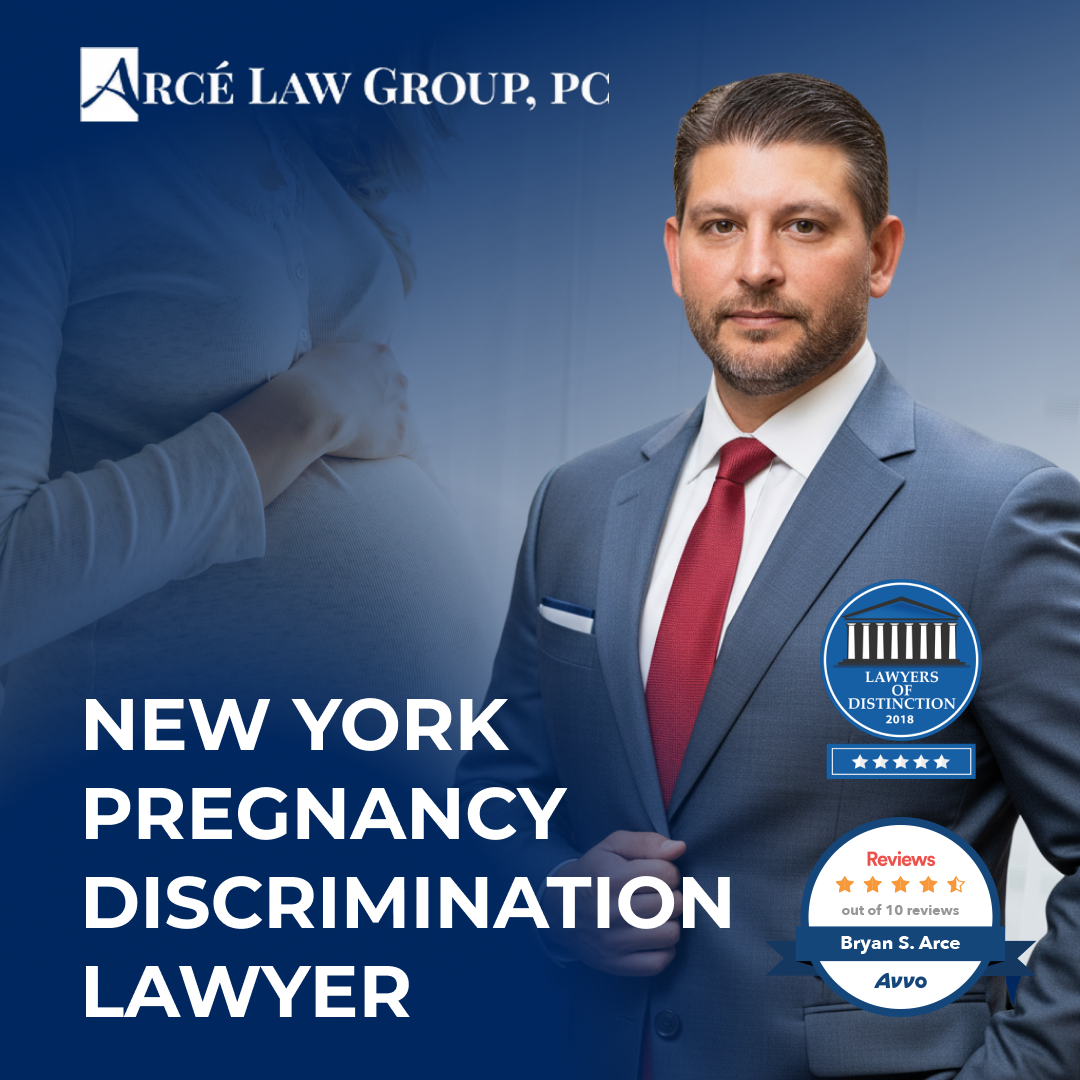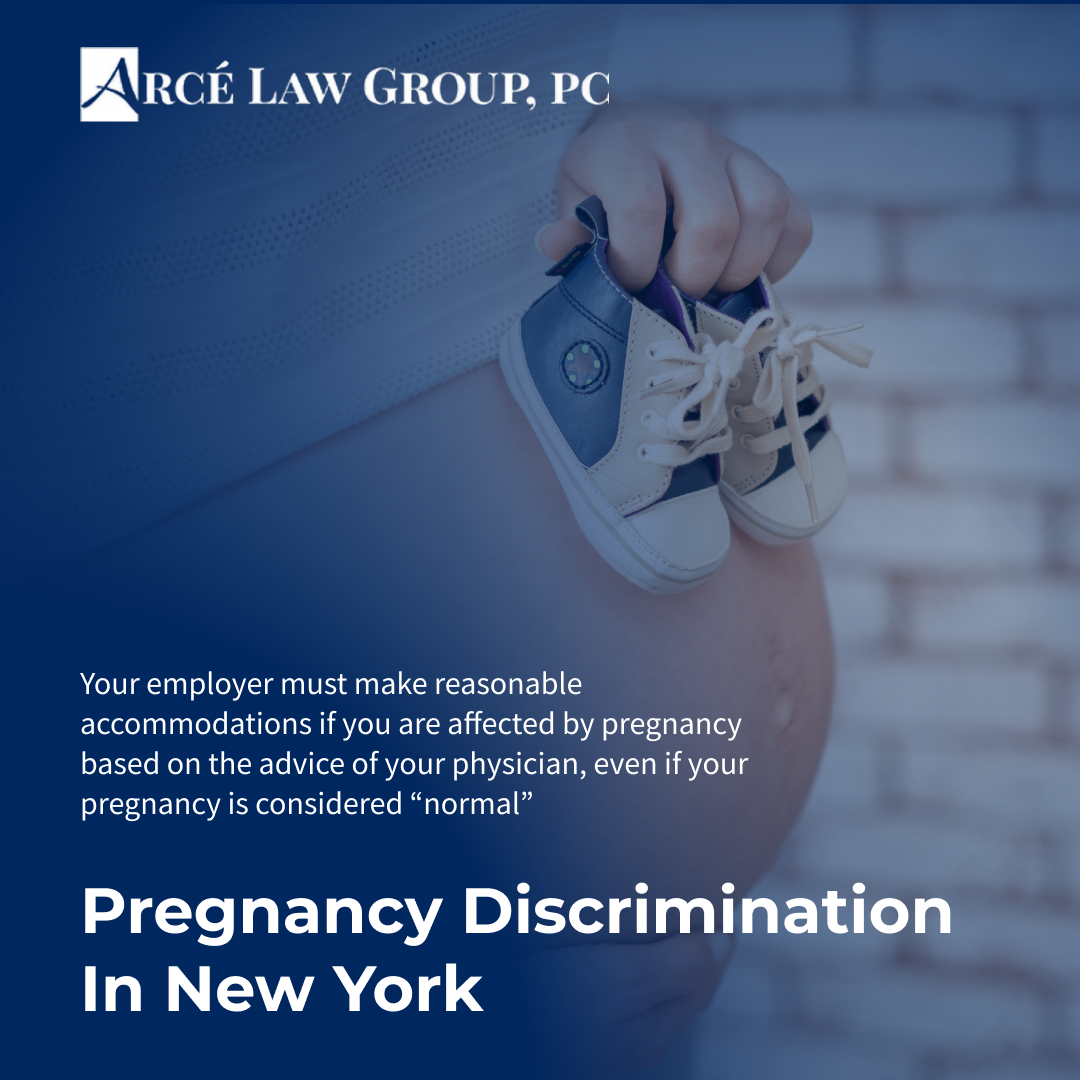
Pregnancy Discrimination In New York
Have you noticed unfair treatment at work after announcing your pregnancy? Maybe your hours changed, your supervisor began imposing stricter discipline, or you even lost your job. Federal and state laws in New York, New Jersey, and Pennsylvania make pregnancy discrimination illegal. Once you decide to expand your family, take time to know your rights. Employers cannot disadvantage you because of your pregnancy. Harassment and discrimination by your employer are not allowed—now is the time to take action.
At the Arcé Law Group, our pregnancy discrimination attorneys defend the rights of working women across New York, New Jersey, and Pennsylvania. Our team of dedicated pregnancy discrimination lawyers in New York City works at the forefront of enforcing pregnancy rights. We assist clients from New Jersey in Newark, Jersey City, and Princeton, as well as New York City and Philadelphia, Pennsylvania.
Stand up for your rights with a trusted pregnancy discrimination attorney in New York City. Get experienced legal support from Arcé Law Group—call (866) 426-7182 now or reach out online!

Federal Laws Protecting Pregnant Women in NJ-NY-PA
Several federal laws protect pregnant women, including Title VII of the Civil Rights Act, the Pregnancy Discrimination Act, the Americans with Disabilities Act, and the Family and Medical Leave Act.
The Pregnancy Discrimination Act (PDA) of 1978 amended Title VII of the 1964 Civil Rights Act to prohibit sex discrimination based on pregnancy, childbirth, or related medical conditions.
When making decisions about hiring, firing, pay, benefits, or other job matters, your employer cannot factor in your pregnancy. These decisions must focus on your skills, work track record, and experience. The PDA applies to any employer with 15 or more employees.
Harassment based on pregnancy or nursing also violates the law.
Disability Leave for Pregnancy-Related Conditions
According to the Americans with Disabilities Act (ADA), if a woman develops a pregnancy-related impairment, her employer must treat her like any other employee with a health issue. Reasonable changes at work could include:
- Offering you unpaid leave
- Offering you disability leave
- Providing light duty
- Giving you temporary assignments
Check with your pregnancy discrimination attorney in New York, New Jersey, or Philadelphia to see if a pregnancy-related condition qualifies as a disability under the ADA. If it does not, you may still have temporary disability rights under the PDA. If your employer denies fair accommodations, you may have grounds for a pregnancy discrimination claim in New York, New Jersey, or Pennsylvania.
Pregnancy Leave and Maternity Leave
If other employees can take leave when temporarily disabled, then the PDA says you must have the same opportunity if pregnancy causes a temporary disability.
Under the Family and Medical Leave Act, you may qualify for up to twelve weeks of unpaid (or paid, if you have accrued time) leave after working at your employer for at least twelve months.
In New York City, extra protections from the New York City Human Rights Law require employers to provide reasonable accommodations for pregnancy, childbirth, or related conditions. These accommodations can include adjusting your duties, changing your schedule, or giving extra breaks—even if you do not meet the federal definition of disability. City law covers businesses with as few as four employees, so even small employers must comply. Knowing your rights under both local and federal rules can increase your options for fair treatment during pregnancy and after returning to work.
The Rights of Nursing Mothers
The Fair Labor Standards Act, enforced by the U.S. Department of Labor, allows nursing parents to express milk at work after returning from leave.
New York City law also requires employers to provide private, accessible spaces—not just bathrooms—and reasonable break times for nursing mothers to pump breast milk at work. The city’s Human Rights Commission investigates claims about lactation rights. If your employer denies you an appropriate lactation room or interferes with your ability to pump, you may have protections under city and state law. Asserting these rights can help you and future parents return to work in healthier, more supportive settings.
How New York City Human Rights Law Protects Pregnant Employees
The New York City Human Rights Law gives pregnant workers more legal protection than many other areas. The law requires employers with at least four employees to provide reasonable accommodations for pregnancy, childbirth, or related health needs. These accommodations may include frequent restroom breaks, lighter duties, modified schedules, or time off for medical appointments.
If you work in New York City, you can seek help through the New York City Commission on Human Rights. This agency investigates claims and enforces the city’s anti-discrimination rules. The Commission can award compensatory damages, order reinstatement, and fine employers who break the rules. Since the New York City Human Rights Law requires a lower standard for proving discrimination or retaliation, pregnant employees in the five boroughs often enjoy more legal rights than those available under state or federal law. Knowing these local protections lets workers make informed decisions about workplace discrimination during or after pregnancy.
Empowering Employees to Take Action
See how we've helped professionals fight back against harassment and retaliation
-
“The best decision of my life was to walk through the doors of the Arce Law Group.”
The best decision of my life was to walk through the doors of the Arce Law Group. There is so much to say and not enough time or characters to fully describe my satisfaction, but overall it was a life changing experience. Christine, Bryan, and Cayetana treated me like I was family. They were open, honest, empathetic, and extremely supportive. Truly a dream team. They were sweet and authentically caring to the point that I never felt alone. Their attention to detail was on point throughout the entire process, and I got the results that I was hoping for. They exceeded my expectations by going above and beyond to advocate for me. I wish I could give them more than 5 stars because the way they championed on my behalf was out of this world. I would not hesitate to refer their services.- F M -
“Highly recommended and compassionate service.”
“Definitely highly recommended - you will not be disappointed.”- Melissa O. -
“The Best”
“He was patient with me through this whole process and answered my million and one questions, which made me feel at ease knowing I made the right decision in choosing him to assist me.”- Elaine M. -
“I Would Recommend This Firm Hands Down”
“My lawyer Laura was so kind and sweet she made me feel like I knew her for years.”- Jeancarlos S. -
“Kind & Patient”
“It was clear from our first phone call that Gregory Kirschenbaum’s compassion and devotion to his line of work were unfeigned.”- Brianna M. -
“Friendly & Supportive”
“Went to Arce Law Group for my Employment Discrimination case and was taken aback by the care and hard work put into my case.”- Mitchell M. -
“Swiftly Replied”
“Mr.Arce not only swiftly replied to my inquiry, but he also spent the time to write out a detailed response to my inquiry and guide me and how to proceed forward.”- Paul C. -
“Best Possible Outcome”
“Max Bracero was my attorney and I recommend him to anyone who needs an employment lawyer.”- Lydia K.
What Can I Do if I Have Experienced Pregnancy Discrimination in NY-NJ-PA?
You must show that your employer treated you less favorably than non-pregnant co-workers in similar roles. First, speak with a qualified pregnancy discrimination lawyer in New York City. Share your story and all supporting evidence with your attorney. After reviewing your information, your attorney will provide options and guidance for your next steps.
Your pregnancy discrimination attorney in New York City may suggest taking one of these three legal routes.
Filing a Charge With the EEOC
You typically have 180 days from the discriminatory act to file a charge with the Equal Employment Opportunity Commission (EEOC). If your case involves a violation of federal law, you may pursue this administrative track before going to court. The EEOC will investigate, and both you and your employer can attempt to resolve the charge through mediation.
In New York City, local agencies like the New York City Commission on Human Rights enforce some of the most robust anti-discrimination laws in the country. Filing a complaint with a city or state agency can help safeguard your rights under city, state, and federal law. Local agencies may also offer specific remedies for employees who live or work within the five boroughs.
If the EEOC charge does not resolve your matter, your attorney may advise filing in federal court.
Filing a Charge With the Division on Civil Rights
You can also file a charge with the New Jersey Division on Civil Rights (DCR). You must act within 180 days of the alleged discrimination. The DCR reviews your complaint and determines whether the New Jersey LAD or the Family Leave Act applies. The DCR can investigate, attempt to settle the case through mediation, or hold a hearing at the Office of Administrative Law.
Understanding Time Limits in New York City Pregnancy Discrimination Cases
Deadlines can impact your pregnancy discrimination case in New York City. Most claims under the New York City Human Rights Law must be filed within three years of the last discriminatory act. Initiating a complaint with city agencies such as the New York City Commission on Human Rights helps secure your rights and can keep your options available. Filing promptly means you protect your right to seek remedies. Delaying could prevent you from filing at all. Knowing these timelines helps you make proactive decisions.
Frequently Asked Questions
Does New York City law offer more protection than federal law?
Yes. The New York City Human Rights Law gives pregnant employees broader protection compared to federal law and covers smaller businesses, making it easier to seek accommodations or take action if you experience discrimination.
Can I request light duty work during my pregnancy in New York City?
Yes. New York City law usually requires employers to consider requests for reasonable accommodations related to pregnancy, childbirth, or related health needs, such as lighter duties, schedule modifications, or workload adjustments.
What evidence should I collect for a pregnancy discrimination complaint?
Keep emails, memos, work schedules, reviews, or correspondence that document any changes in treatment since your pregnancy announcement. Medical notes supporting your accommodation requests and statements from witnesses can also be helpful.
